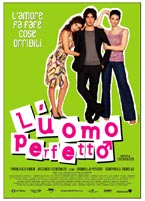|
David Rhodes Archive
|
|
L'Uomo Perfetto
Soundtrack
  On September 20, 2005, the film "L'Uomo Perfetto" will be released on DVD. Just after completing work on the film's soundtrack, David was kind enough to answer some questions about it. In addition, he has provided us with a few pieces of music from the film, which you can hear by clicking on the links at the bottom of this page.
Q. How do you get started on such a project? Where do you draw your initial inspiration?
A. Script, and director; there are always ideas from the director which need to be appreciated and fulfilled. I started by working on a song for [the film] (which I had not been asked for), after meeting the director and editor for an evening and viewing some rough footage of the film. We had discussed instrumentation and approach, after that he left me to it, only querying a handful of cues as we went along. To begin with he would put pieces where he felt they should go, but after I started to work with the final edit, it was easier to give precise placement for pieces. Q. How do you write - do you start with a melody or a rhythm? A. I had some chords that I liked, which seemed suitable and melodic enough to develop as a song, which is where I started. Q. Did you have footage to work with? The film is in Italian - did that complicate matters at all? A. For most of my time I had the finished edit to work to, which I think is rare. The director provided me with an English script, but even with that I managed to not interpret a couple of scenes as he felt fit. Q. Who did you work with on the project? A. The soundtrack is mostly my work with help from Ged [Lynch], John Giblin, and string arrangements by Richard Evans. Q. To produce so much music in such a short time must be difficult. Can you just sit down and decide "Now I will write" or must you wait for inspiration to strike? A. The sculptor, Henry Moore, said that art is ninety per cent perspiration and ten per cent inspiration. This is a good truism, the more you do , the more you can do. Q. Did the short time frame affect the way you worked on the project? A. Yes, it was all too quick really. I had to write, send roughs and then jump in with the recording before everything was okayed. Mp3s for roughs which the director tried in different parts of the film. He came over when we were mixing to suggest a couple of rewrites and changes. Q. Lyrics before music or vice versa? A. Music first, though writing a film song requires attention to the script, so the lyric ideas needed to be considered early in the project. Q. How would you describe the music on the soundtrack? A. Well, I suppose naïve, in the style of my guitar playing. I had to provide all the background music too, so there are some little dancey programmed pieces, along with the thematic pieces, which are mostly guitar, double bass and piano and drums. Q. Do you let the pictures always drive the music or, at times, do you try to affect the action by the addition of the music? A. In an animated film, music can dictate the mood, during song interludes, otherwise it has to reflect and enhance the action. The same applies for live action, where the action has to be supported and mood developed. Directors’ opinions are nearly always right. They’ve worked with the script, the actors and the crew to create something that music should complement. Music is powerful, but it should never dominate the action. Two pieces to give you a taste of the soundtrack: Morning After Plus, the single from the film: Used with kind permission of the author |